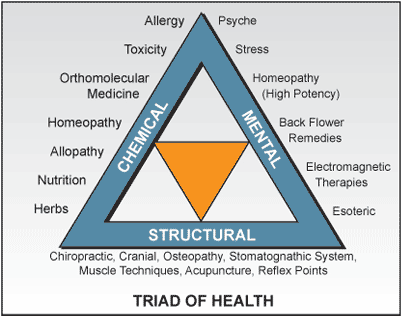Applied Kinesiology
What is Applied Kinesiology?
Applied Kinesiology (AK) is a form of diagnosis using muscle testing as a primary feedback mechanism to examine how a person’s body is functioning. When properly applied, the outcome of an AK diagnosis will determine the best form of therapy for the patient. Since AK draws together the core elements of many complementary therapies, it provides an interdisciplinary approach to health care.
In general, the doctor finds a muscle that tests weak and then attempts to determine why that muscle is not functioning properly. The doctor will then evaluate and apply the therapy that will best eliminate the muscle weakness and help the patient.
Therapies utilized can include specific joint manipulation or mobilization, various myofascial therapies, cranial techniques, meridian therapy, clinical nutrition, dietary management and various reflex procedures.
In some cases, the doctor may test for environmental or food sensitivities by using a previously strong muscle to find what weakens it.
Applied kinesiology uses the triad of health – chemical, mental and structural factors – to describe the proper balance of the major health categories.
The triad is represented by an equilateral triangle with structural health as its base, and the upright sides representing chemical and mental health. When a person experiences poor health, it is due to an imbalance in one or more of these three factors. For example, a chemical imbalance may cause mental symptoms. Applied kinesiology enables the doctor to evaluate the triad’s balance and direct therapy toward the imbalanced side or sides.
Applied kinesiology interactive assessment procedures represent a form of functional biomechanical and functional neurologic evaluation. The term “functional biomechanics” refers to the clinical assessment of posture, organized motion such as in gait, and ranges of motion. Muscle testing readily enters into the assessment of postural distortion, gait impairment and altered range of motion. During a functional neurologic evaluation, muscle tests are used to monitor the physiologic response to a physical, chemical or mental stimulus. The observed response is correlated with clinical history and physical exam findings and, as indicated, with laboratory tests and any other appropriate standard diagnostic methods.
If you haven’t been in the office lately and have any questions on how Applied Kinesiology works, it would be my pleasure to answer any questions. We would be happy to invite you to a functional evaluation using Applied Kinesiology, exploring all three aspects of health – structural, chemical, and emotional. You probably will learn more about your body than you ever thought possible.
More info on Applied Kinesiology can be found here: http://www.icakusa.com/

